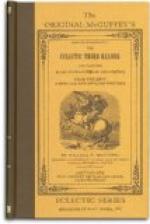7. One day, a poor little girl with a very ragged dress was going by and Susie heard some children teasing her and making fun of her.
8. She at once ran out to the gate, and asked the poor little girl to come in. “What are you crying for?” Susie asked.
9. “Because they all laugh at me,” she said.
10. Then Susie took the little girl into the house. She cheered her up with kind words, and gave her a nice dress and a pair of shoes.
11. This brought real joy and gladness to the poor child, and she, too, thought that Susie was rightly called Sunbeam.
LESSON XIII.
wood’lands di vine’ raised un til’ droop’ing blessed
whose seek up’ward hov’els in’ner steal
heav’en hearts lil’ies die roam’ing
IF I WERE A SUNBEAM.
1. “If I were a sunbeam,
I know what I’d
do;
I would seek white lilies,
Roaming woodlands through.
I would steal among them,
Softest light I’d
shed,
Until every lily
Raised its drooping
head.
2. “If I were a sunbeam,
I know where I’d
go;
Into lowly hovels,
Dark with want and woe:
Till sad hearts looked upward,
I would shine and shine;
Then they’d think of heaven,
Their sweet home and
mine.”
3. Are you not a sunbeam,
Child, whose life is
glad
With an inner brightness
Sunshine never had?
Oh, as God has blessed you,
Scatter light divine!
For there is no sunbeam
But must die or shine.
Second Reader. 35
Lesson XIV.
sup port’ a long’ boots be long’ dol’lar years
man’age taught cor’ner no’tice mon’ey black’ing
gen’tle men hon’est (on’est) quite buy earned
[Illustration: Boy offering to shine man’s shoes.]
Henry, the bootblack.
1. Henry was a kind, good boy. His father was dead, and his mother was very poor. He had a little sister about two years old.
2. He wanted to help his mother, for she could not always earn enough to buy food for her little family.
3. One day, a man gave him a dollar for finding a pocketbook which he had lost.
4. Henry might have kept all the money, for no one saw him when he found it. But his mother had taught him to be honest, and never to keep what did not belong, to him.
5. With the dollar he bought a box, three brushes, and some blacking. He then went to the corner of the street, and said to every one whose boots did not look nice, “Black your boots, sir, please?”
6. He was so polite that gentlemen soon began to notice him, and to let him black their boots. The first day he brought home fifty cents, which he gave to his mother to buy food with.




